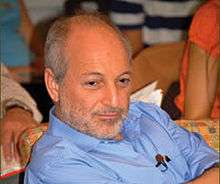André Aciman
| André Aciman | |
|---|---|
 André Aciman in 2009 | |
| Born |
2 January 1951 Alexandria, Egypt[1] |
| Occupation | writer |
| Period | 1990s-2000s |
| Genre | short story, novel, essay |
André Aciman (born 2 January 1951) is an Egyptian-born writer, currently distinguished professor at the Graduate Center of City University of New York, where he teaches the history of literary theory and the works of Marcel Proust.[2][3] He is the author of several novels, including Call Me by Your Name (2007). His memoir, Out of Egypt (1995), won a Whiting Award.[4]
Aciman previously taught creative writing at New York University and French literature at Princeton.[5][6] In 2009 he was Visiting Distinguished Writer at Wesleyan University.[7][8][9]
Early life and education
Born in Alexandria, Egypt, Aciman was raised in a French-speaking home where family members also spoke Italian, Greek, Ladino and Arabic.[5] His family were Jews of Turkish and Italian origin who had settled in Alexandria in 1905.[6]
Aciman moved with his family to Italy when he was a teenager and a few years later to New York.[5] He obtained a B.A. in English and Comparative Literature from Lehman College and an A.M. and Ph.D. in Comparative Literature from Harvard University.
Out of Egypt
Aciman's 1995 memoir, Out of Egypt, was reviewed widely.[10][11] In The New York Times, Michiko Kakutani described the volume as a "remarkable memoir...that leaves the reader with a mesmerizing portrait of a now vanished world."[6] She compared his work with that of Lawrence Durrell and also wrote: "There are some wonderfully vivid scenes here, as strange and marvelous as something in Garcia Marquez, as comical and surprising as something in Chekhov."[6]
Awards
- 1995 Whiting Award
Works
Books
- Out of Egypt (memoir) (1995)[2][3]
- False papers: essays on exile and memory (2000)[2][3]
- The Proust Project (2004)[2][12]
- Call Me by Your Name (novel) (2007)[13][14][15]
- Eight White Nights (novel) (2010)
- Alibis: Essays on Elsewhere (2011)
- Harvard Square (novel) (2013)
Essays and short fiction
- "Reflections of an Uncertain Jew". The Threepenny Review. 81. Spring 2000.
- "Monsieur Kalashnikov". The Paris Review. 181. Summer 2007.
- "Abingdon Square". Granta (122: Betrayal). Winter 2013. (Subscription Required)
References
- ↑ Epstein, Joseph.""Funny, But I Do Look Jewish"". Archived from the original on 18 December 2005. Retrieved 2009-09-23. , The Weekly Standard 15 December 2003
- 1 2 3 4 "André Aciman". City University of New York. Retrieved 18 August 2009.
- 1 2 3 "André Aciman". City University of New York. Retrieved 18 August 2009.
- ↑ "Winners of Whiting Awards". The New York Times. 30 October 1995. p. C.15. Retrieved 21 September 2009.
Andre Aciman, whose first book, Out of Egypt (Farrar, Straus & Giroux, 1995), chronicles his childhood in Alexandria, Egypt.
- 1 2 3 Meet the author: Aciman says he's all his characters, Marin Independent Journal, 24 May 2008
- 1 2 3 4 Kakutani, Michiko (27 December 1994). "Books of the Times: Alexandria, and in Just One Volume". The New York Times. p. 21. Retrieved 21 September 2009.
- ↑ Rosenberg, Gabe. "Novelist and Visiting Prof. Andre Aciman Shares His Creative Process - Arts". The Wesleyan Argus. Retrieved 4 December 2013.
- ↑ "Andre Aciman - Google-profile". Google.com. 18 October 2013. Retrieved 4 December 2013.
- ↑ "Andre Aciman: Books, Biography, Blog, Audiobooks, Kindle". Amazon.com. Retrieved 4 December 2013.
- ↑ "Exodus From Egypt," The Washington Post, 15 February 1995, P. D02
- ↑ Walters, Colin. "Visit to 'very small, very strange world'" The Washington Times, 19 March 1995, Page B6
- ↑ Aciman, Andre (16 June 2004). "Sailing to Byzantium by Way of Ithaca". The New York Sun. p. 1.
Proust fans filled the Celeste Bartos Forum at the New York Public Library on Wednesday for an evening titled 'The Proust Project: A Discussion With Latter-Day Disciples, Admirers, and Shameless Imitators.' The event celebrated the publication of a book called The Proust Project in which Andre Aciman, a professor at CUNY Graduate Center, asked a group of writers to reflect on In Search of Lost Time.
- ↑ Meaney, Thomas (Feb–Mar 2007). "Naming Youths". Bookforum. Retrieved 21 September 2009.
How strange that Aciman's first novel should run against the Proustian grain.
- ↑ Ormsby, Eric (24 January 2007). "Nature Loves to Hide". The New York Sun. p. 13.
pays its respects to Proust but is brilliantly original....This is a novel of seduction in which the final prize is to win back something small but precious from the coquettishness of memory.
- ↑ D'Erasmo, Stacey (25 January 2007). "Suddenly One Summer". The New York Times. Retrieved 21 September 2009.
This novel is hot. A coming-of-age story, a coming-out story, a Proustian meditation on time and desire, a love letter, an invocation and something of an epitaph, Call Me by Your Name is also an open question. It is an exceptionally beautiful book.
External links
- Aciman, André (8 June 2009). "The Exodus Obama Forgot to Mention". New York Times. Retrieved 21 September 2009.
- An Interview with Andre Aciman, bookslut.com
- Andre Aciman on Writing, His Work and Inspirations on YouTube
- Novelist and Visiting Prof. Andre Aciman Shares His Creative Process, The Wesleyan Argus
- Profile at The Whiting Foundation
- Google profile